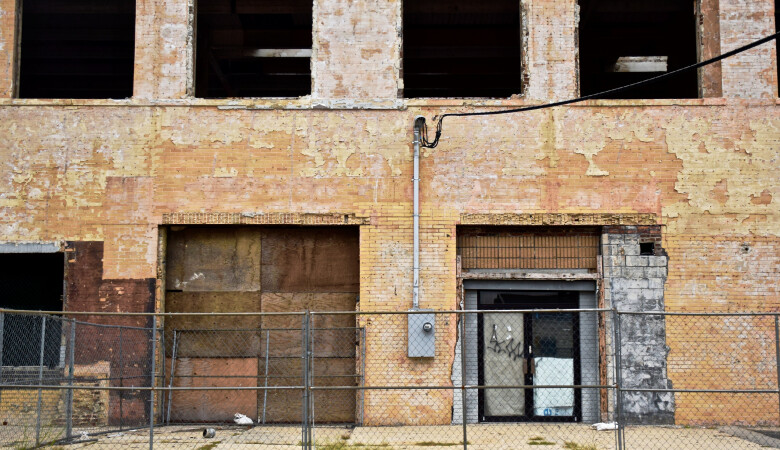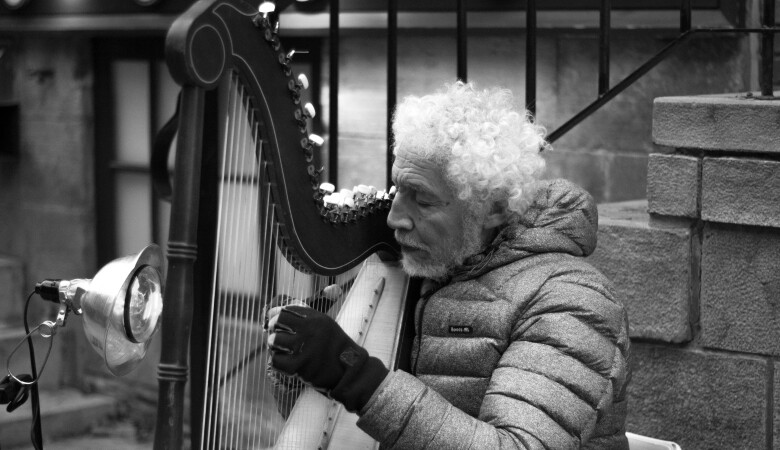A Brilliant Light Shining in the Darkest Night (Matthew Sermon 141 of 151)
April 28, 2013 | Andy Davis
Matthew 26:47-56
Death & Dying, How Jesus Views Scripture, The Word of God, Courage, The Kingdom of Christ
sermon transcript
The Darkest Night in History…Christ Shining All the Brighter
As we come to Matthew 26:47-56, you heard Tim read it, we come to the tragic and in many ways repulsive account of the betrayal of Jesus by Judas and the forsaking of Jesus by all of his disciples. The arrest of the Son of God by wicked men. And in this account, we're gonna see the sinfulness of the human heart in its darkest colors. But also, by contrast, we're gonna see the glory of Jesus Christ shining radiantly, all the brighter because of the darkness of men. The night that Jesus was born, you know that that night was ripped apart by the appearance of a single angel, and he appeared to the shepherds, and the glory of the Lord shone all around, and it was a light that was visible and they were terrified by that light.
This Was the Darkest Night in History
But I say that this night, the night that Jesus was arrested, the night he was put on trial by the Jewish people, there's a different kind of glory that shines. It wasn't a radiant light that shone from his face, but it was a light that we can see by faith. I think we could argue that that was the darkest night in human history. The metaphor of darkness is very important according to the Apostle John; he uses it often in his gospel to speak of the wickedness that there is in the universe.
And that night, in particular, was a dark wicked night. How Jesus at the Last Supper gave a piece of bread to Judas, and in John 13:27, it says, “As soon as Judas took the bread, Satan entered into him.” And three verses later, in John 13:30, it says, “As soon as Judas had taken the bread, he went out. And it was night.” Now, if you know anything about John's Gospel, you know that’s not just a chronological, historical comment. That has a depth to it. It was night as Judas went out to do his evil deed. The darkness is human sinfulness, the wickedness of the human heart. When the alliance between man and Satan reaches its nadir, it's lowest point, Jesus called this a time of darkness.
In Luke's account, in Luke 22:53, he said to his arresters, those that were there to arrest him, to seize him, he said, “Every day I was with you in the temple courts, but you did not lay a hand on me. But this is your hour - when darkness reigns.” Do you hear that statement? “This is your hour when darkness reigns.” And that's why I say, this was the darkest night in human history.
We see the sinfulness of Judas's treachery, his betrayal, culminating in maybe one of the most repulsive moments in all of redemptive history: his kiss of Jesus on the cheek. We see the sinfulness of the chief priests and the elders of the Jewish nation, who should have recognized the time of God coming to them, in the person of Christ, but who instead killed him out of pride and out of greed and jealousy. We see the sinfulness of the Roman soldiers in the crowd who are there to arrest the Prince of Peace with swords and clubs. We see the sinfulness of Peter who through unbelief refused to accept what God was doing through Jesus. He could not get it, and was fighting it. Literally fighting it, right to the end. We see the sinfulness of all the disciples who at the human level should have stuck with Jesus out of loyalty and love for him at His hardest time, but instead out of selfishness, fled to save their lives. This was the darkest night in history when the human race arrested, tried, condemned, mocked, tortured God the Son.
Christ the Light of the World
You know, in the 10 plagues, Moses spoke of a darkness that could be felt, and you can feel that as you read the account from Matthew, Mark, Luke, and John of this night. You can feel a darkness.It's a darkness that could be felt, and yet in the center of that, the darkest night in human history, the light shines in the darkness and the darkness cannot conceal it, it cannot quench it, it cannot hold it back. Light wins here in this account, to the glory of God.
Jesus said in John 8:12, “I am the light of the world.” It says in John 1, “In the beginning was the Word, and the Word was with God, and the Word was God. He was with God in the beginning. Through him all things were made, without him, nothing was made that has been made. In him was life, and that life was the light of men. The light shines in the darkness, and the darkness cannot conceal it. It has not understood it.” And then 1 John 1:5, “This is the message we have heard from him and declare to you: God is light and in him, there is no darkness at all.”
And Jesus Christ is the perfect light of God, an absolutely perfect display of “the radiance of God's glory and the exact representation of his being,” Hebrews 1:3. And to see him is to see the Father, as he said earlier that same night in John 14. Remember how Philip said, “Lord, show us the Father and that will be enough for us.” And Jesus said, “Don't you know me, Philip, even after I have been with you all this time? Anyone who has seen me has seen the Father. How can you say, ‘Show us the Father?’”
So, how does this account, how does Jesus put the glory of God on display, on this darkest night? Behold his courage, going willingly to his death at the hands of such evil men. Behold his humility, making himself nothing. And being treated so shamefully, even to the point of death, even death on a cross. Behold his love, laying down his life for his sheep. Behold his authority. If that detachment of angels had come, you would have seen his authority. They would have obeyed him immediately. Behold his submission to the scripture and to his Father's will as revealed in the scripture. Behold his patience in not striking down his enemies though they deserved it, but waiting patiently. Truly his light shines in the darkness and the darkness cannot conceal it.
Christ's light, I think, shines all the brighter when human sin is at its darkest, doesn't it? By contrast. Just by seeing all of these people, even the best, even Peter and the other apostles, still sinful, we see Christ's light shining all the brighter.
Marvel at the Fact: The Son of God Arrested!
Just marvel at this fact. Just marvel, at God the Son being arrested. Just think about that. Think about it, as it says in John 18:12, how they tied up his wrist, you picture his hands being put behind his back and it being tied up with some cords. I was just teaching earlier this morning on the Book of Judges. You know how Jesus again and again, says things like, “They repented at the preaching of Jonah, and now one greater than Jonah is here. The queen of the South came from the ends of the earth to listen to Solomon's wisdom, and now one greater than Solomon is here.” Are you willing to say with me that one greater than Samson was arrested that night? I think so. And Samson, you remember the story in Judges 15, how they bound his wrists and the Philistines came upon him, so enraged and they wanna kill him, remember, and he breaks those things apart like charred flax and struck down a thousand of them with the jawbone of a donkey.
So why didn't Jesus do that? If Jesus is greater than Samson, why didn't he break the bonds and kill all his enemies? Well, because he wasn't willing to do that. “No one takes my life from me, but I lay it down freely of my own accord. I have the power, the authority, to lay it down, and I have the authority to take it back up again. This command I received from my Father.” So, Jesus let those ropes bind him, though they couldn't if he had willed not. He let himself be arrested, he let himself be led away and be shamefully treated.
Judas Betrays Jesus With a Kiss: The Darkest Act of the Night (vs. 47- 50)
Now, the whole thing begins with this disgusting act of Judas, of Judas bringing this detachment. Look at it in verses 47-50. Judas betrays Jesus with a kiss, which is the darkest act of the night. Look at verse 47 and following, “While he was still speaking, Judas, one of the twelve, arrived. With him was a large crowd armed with swords and clubs, sent from the chief priests and the elders of the people. Now the betrayer had arranged a signal with them, ‘The one I kiss. - The one I kiss is the man, arrest him.’ Going at once to Jesus, Judas said, ‘Greetings, Rabbi’ and kissed him. Jesus replied, ‘Friend, do what you came to do.’ And then the men stepped forward and seized Jesus and arrested him.”
While He Was Still Speaking
So the account begins with the words, “While he was still speaking.” So there's a sense of rhythm and flow here. You have to divide it up as you preach, as you study, it talks about rightly dividing the Word of Truth, and so you take pieces and look at them, but this is a flow. It's a narrative, and so one thing leads right into the next, and the last thing we had was Gethsemane. And Jesus makes the most of every opportunity of every moment to pray. He goes right to the wall on prayer, and as soon as he gets done praying one final time, saying, “Not my will but yours be done,” he goes back, he awakens his disciples. He says, “Are you still sleeping and resting? Behold, the hour is near, and the Son of Man is betrayed into the hands of sinners. Rise, let us go! Here comes my betrayer!” And while he was saying that, then the account starts tonight.
Now, I think, as you put it together from John's gospel, Jesus went out to meet his captors. I get the picture of Gethsemane being a walled garden and there was a gate of some sort. And so they're ready to come in and arrest him. They're there with torches, they're gonna search for Jesus, they're gonna look for him as though he's hiding under a bush. Of course, it was a full moon, that's the way the lunar calendar worked. And so they're not gonna need to search for him. Jesus goes out, it says very plainly in John 18, “Jesus, knowing all that was going to happen to him, went out and said, ‘Whom are you seeking?’” Who begins, who initiates this whole thing? It's Jesus. So, what was Judas there for? What was his job? He didn't have a job. He was not necessary. Jesus didn't need him. There was no need to be betrayed. He goes out and initiates the whole interaction. “Who are you looking for?” “Jesus of Nazareth,” they answer.
You remember what happened next in John's gospel - if I'm not careful, I might just go preach John right now. But he said, “I AM.” And when he said, “I AM,” God's almighty name, they drew back and fell to the ground. And then Jesus asked them a second time, “Who is it you're seeking?” And they said, “Jesus of Nazareth.” And so, twice he makes them repeat their orders. That's how the whole thing starts. And it very much harmonizes with our account here in Matthew. Jesus said, “Rise, Let us go! Here comes my betrayer!” So who's taking the initiative? Jesus. Where are they going? They're going out of Gethsemane, they're going out to meet this crowd.
Judas, One of the Twelve
And so there's Judas, and here he comes with this entourage, this crowd coming to arrest him, and he's just simply identified, it's amazing the power of understatement here, “Judas, one of the twelve.” Doesn't go into great detail, doesn't demonize him. It just says, simply, he's one of the twelve, and I think in that understatement, it underscores the perfidy, the betrayal, the wickedness. He was just one of the twelve. He was there to betray Jesus. Psalm 41:9, “Even my close friend, whom I trusted, the one who shared my bread, has lifted up his heel against me.”
The Crowd with Judas
And with him, verse 47, is “a large crowd armed with swords and clubs, sent from the chief priests and the elders of the people.” So they're ready for a fight. According to John's gospel, it's a spira, a detachment of Roman soldiers, may be as many as 600 strong. If you add a good group of temple police, there could have been as many as a thousand people there to arrest one man. It's really quite amazing because Jesus was the leader of a peaceful discussion group, Bible discussion group in the temple area. I mean, that's it. He didn't have a violent bone at all, and he was a Prince of Peace, and he underscores that, doesn't he?
In verse 55, he says, “Am I leading a rebellion? Is this the nature of what you see in me? Am I leading a rebellion that you've come out with swords and clubs to capture me? Every day, this is what I did, I sat in the temple courts teaching, and you did not arrest me. So, why are you armed to the teeth?” Very late at night, perhaps, I would think better, we would think of it as very early in the morning. I don't know, one, two, three in the morning. It's very, very early in the morning. Late at night, it's the dead of night. And this mixed multitude is such a metaphorical picture of the world, as they, this rabble, this huge group of people coming there to do this. Those that knew him were unjust, because he was the only sinless man that ever lived. He'd never done anything wrong. They were unjust in seeking to arrest him.
Most of the crowd there was just mindless. They didn't know him. They were just following orders. They were getting a paycheck. And so it is that many of the persecutors in church history are mindless, they don't know Jesus, they don't care about Jesus. They're just following orders and getting a paycheck doing it. And so, in many of the persecuting nations of the world, that kind of thing goes on. People that show up, they just have their orders. They're just mindless, they don't know who he is, they ignore Jesus, the central figure of all of human history, they have no thought about him at all. Mindless.
They're also cowardly coming at night rather than in broad daylight because you know that the chief priests and the elders were afraid of the crowds, for they all held that Jesus was a prophet. And this crowd was blasphemous, simply in arresting, laying hands on God the Son. And then comes the kiss.
The Kiss
Now, what are we to make of this? “Now, the betrayer had arranged a signal with them: ‘The one I kiss, is the man, arrest him.’ And going at once to Jesus, Judas said, ‘Greetings, Rabbi,’ and kissed him.” This is the most repulsive part of this entire affair. It really is disgusting. What do I mean by that? Well, Judas had already received his 30 pieces of silver to betray Jesus. The evil signal was in the mind of Judas before he ever got there. “How am I gonna identify him and pick him out? Oh, I have a thought. How about if I kiss him?” I think it was demonic. I think it was Satan-suggested. It's a wicked twist.
Now, a kiss is a sign of a loving relationship, it's a sign of friendship. Now, think about the relationship, especially back then, a slave would perhaps kiss the feet of the master, may be a servant, a house servant kiss the hem of the garment, may be the back of the hand. Somebody closer might have a little more intimacy there, but it would be initiated by the one in charge, by the leader, not by the son or the servant or the friend. Judas just goes boldly up to Jesus - in the Greek, it says “kataphileo,” the “kata” prefix means “repeatedly.” It's an intensifier. He really kissed him a lot, right on the cheek as though they were complete equals.
And also, it's so hypocritical. He is appearing to be a very close and intimate friend with Jesus, but in that act, he's betraying him to death. It really is disgusting. It's the height of hypocrisy here. Because you know that the other, the twelve didn't know what he was out doing, and so maybe he knew that and thought he could just kind of come back in with a group at this point and be welcomed back in. Jesus, in Luke's Gospel, heightens the irony, the hypocrisy of it. He said, “Judas, are you betraying the Son of Man with a kiss?” He just asks the question.
Jesus’ Last Words to Judas
But here in our text, in verse 50, he says, “Friend,” and I love this, “Do what you came to do.” Now, I find this interesting because if you couple it with John's gospel, when he took the bread, remember after Satan entered into him, it says in John's gospel, Jesus said to him, “What you are about to do, do quickly.” Now, I'm gonna take it this way. Jesus is a King and he's giving a command, and he does it twice. He does it in John's gospel, “What you are doing, do quickly,” and Satan is in him. And here, the same thing, “Do what you came to do.” Who's in charge here, friends? Who's in charge? Jesus is the King, the sovereign of all the world. It's going exactly according to plan. Jesus reigns, even at this moment, even with this kiss.
Peter’s Faithless Fight (vs. 51)
Matthew, Mark, and Luke Maintain Anonymity… John Tells Us it was Peter
Next comes the faithless fight of Peter. After that will come the cowardly flight. But here is the faithless fight. Verse 51, “With that, one of Jesus' companions reached for his sword, drew it out and struck the servant of the high priest, cutting off his ear.” Now, it's interesting how Matthew, Mark, and Luke all retain anonymity for this guy. But we know who it is, don't we? You probably could have guessed anyway, but John's gospel tells us directly who it is. It was Peter that did it. Now, New Testament scholars wonder if at that point, Peter might have been in Roman hands, tried for his life, and these Gospel accounts perhaps sought to protect him from Roman reprisals. That's just a guess. We have no idea, but Matthew, Mark, and Luke don't tell us who it is.
Peter Consistently Refused to Believe Jesus’ Words About the Cross
But it was Peter and it really is in some ways the final act of a very sad drama in Peter's life. And what is that, it’s that he just couldn't accept what Jesus was saying about his death. He couldn't, wouldn't accept it. He could not believe that Jesus would die. The first time we see this is in Matthew 16, in Caesarea Philippi, when Peter gives his magnificent testimony, his confession of Jesus, remember that? “You are the Christ, the Son of the living God.” And Jesus said, “Blessed are you, Simon, son of Jonah, for this was not revealed to you by man but by my Father in heaven. And I tell you that you are Peter and on this rock, I will build my church, and the gates of hell will not prevail against it.”
Yeah, but, “From that time on,” it says in the account, “Jesus began to explain to his disciples that he must go to Jerusalem and suffer many things at the hands of the elders, chief priests, and teachers of the law, and that he must be killed, and then on the third day, be raised to life. Peter took him aside and began to rebuke him. ‘Never, Lord!’ he said. ‘This shall never happen to you!’ Jesus turned and said to Peter, ‘Get behind me, Satan! You're a stumbling block to me; you do not have in mind the things of God, but the things of man.’” Well, that's the first indicator we have that Peter couldn't accept it. And it happens again and again, but this is the culmination of the act.
Earlier, Peter Had Boasted… .Now He Put His Sword Where His Boast Was
Now, earlier Peter had boasted, “Even if I have to die with you, I will never disown you.” And so, I think to prove his loyalty, to prove his words, to make them come true, he draws out his “makhaira” is what it is in the Greek. It's basically like a long fisherman's knife for flaying fish, maybe cutting cheese and bread. That's really what it is. It's not a gladius, the Roman short, strong stabbing sword.
This thing isn't going to last long in a sword fight. But he pulls it out and starts swinging wildly. Alright. I don't think he was any more skillful at soldiering than he was clear in understanding Christ's purpose. So he just starts swinging. Remember how Abishai said to David concerning Saul, who was lying there, he had a spear, he said, “Let me pin him to the ground. I won't strike him twice.” I love that. Isn't that great? Don't you love confident soldiers around you? “I won't strike him twice. I got this one.” Well, Peter wasn't in that class. Alright. There was a need to strike multiple times, with Peter, because all he got was an ear. I don't think he was trying for an ear, but that's all he got.
We don't know who it is from this account, but John gives us full information. Servant's name was Malchus. And isn't it absolutely tragic what Peter is trying to do? Stop the death of the Son of God for the sins of the world. Do you see how horrible that is? How faithless that is? How he would have been signing his own eternal death warrant by so doing, and ours too, all of ours? Because Christ had to die.
Jesus Healed Malchus’s Ear
Jesus, it doesn't tell us this in Matthew, but Jesus healed Malchus's ear. Isn't that beautiful? A display of the love that Jesus has for his enemies and his ability to create an ear out of nothing, out of thin air. Isn't that magnificent? A fully formed adult ear. Ponder that. But he does it.
Peter’s Action a Symbol of Misguided Faithless Mission in Christ’s Name
Peter's action was a symbol of misguided faithless mission in Christ's name, and I'm gonna talk more about this in the application section. But the kingdom of God does not advance by the sword, doesn't advance by killing. No, it advances by dying, either metaphorically or even literally. That's how it advances. We'll get to that more at the end.
Jesus’ Perfect Submission to Scripture (vs. 52-56)
Jesus’ Command to Peter: Put Your Sword Back in its Place (vs. 52)
Here in verses 52-56, and I get goosebumps every time I come to this. This is the most spectacular display of submission to scripture you will ever find anywhere. “‘Put your sword back in its place,’ Jesus said to him. ‘For all who draw the sword will die by the sword. Do you think I cannot call on my Father and he will at once put at my disposal more than twelve legions of angels? But how then would the scriptures be fulfilled that say it must happen in this way?’ And at that time, Jesus said to the crowd, ‘Am I leading a rebellion, that you have come out with swords and clubs to capture me? Every day I sat in the temple courts teaching and you did not arrest me. But this has all taken place, that the writings of the prophets might be fulfilled.’ Then the disciples all deserted him and fled.”
So what we have here, if you just look at it grammatically, you'll look at what's happening, we have a single command given to Peter buttressed by three arguments, three reasons. The command is “Put your sword back in its place.” He then gives three reasons. Reason number one, “For all who draw the sword will die by the sword.” Reason number two, “If I were trying to escape death, I wouldn't be using you and your little dagger.” Reason number three, and the ultimate reason, “Scripture commands me to die, and so I must die.” So there's a hierarchical ordering here of his reasons concerning this command.
Now, keep in mind that Jesus intended his twelve to escape that night. He wanted them to get away. If you don't know that, then read John 18, putting that account together, Jesus after his second time, remember how he says, “I AM,” they all fall to the ground. Jesus repeats the question, he says, “Who are you looking for?” They answer again, “Jesus of Nazareth.” Jesus answers again, saying, “I told you that I AM. If you're looking for me, then let these men go.” And then John tells us incredibly well, “This happened,” John 18:9, “This happened so that the Scripture will be fulfilled,” or so that the words he had spoken would be fulfilled, “I have not lost one of those you have given me.”
This is Jesus, the Good Shepherd, filtering out the temptations and attacks on his disciples. They couldn't handle being arrested that night, and it wasn't God's plan for them to be arrested that night. And so, he makes a way of escape, like it says in Corinthians that he does, he opens a door and he wants them to run away. He wants them, all of them to run away. Peter is completely off track here, both in terms of God's eternal plan and Christ dying on the cross, and in terms of his own plan that Christ intended for him to go away. And so, he gives the command, “Put your sword back in its place. Stop.”
Reason #1: All Who Draw the Sword Die by the Sword
Reason number one, “All who draw the sword will die by the sword.” This is actually a pretty famous statement, live by the sword, die by the sword. You hear that a lot. I think that there are different ways to take it, let's take it this way first: Jesus is giving Peter a strong dose of reality by speaking of Peter's death, okay. “The only way, Peter, you're gonna get out of that fight is if I exert supernatural power on your behalf, and I'm not going to do that.” Simply put, “You are outnumbered. Put your sword away.” We'll just take it like that.
I look on it somewhat like a hostage crisis situation in like a major city like Chicago or something like that, and some crazed guy has been holding 50 people hostage, the negotiator gets him out of the door and he's there. And as soon as he stands out there and he's talking and they're still negotiating, maybe he's wearing a long winter coat or something like that, and there is interestingly like 60 or 70 laser dots all over his chest and body and all that. You know what they are? Those are sniper rifle scopes and all that. And if he makes a sudden move into his coat, what do you think is gonna happen to him? I don't think they'll be able to find him. Okay, if there's 600 Roman soldiers, they conquered the world, you've got your fishing knife, put your sword away. Alright.
Deeper, there's a deeper possibility on this statement: it's a general proverb, people who live a life of violence tend to die by violence. And it's in that proverbial way of speaking, it's generally true that if you live a life of violence, you're going to die by violence. It's just generally true. The measure you use is the measure you receive. So it's a warning about gangs, frankly. If you live by the gun, you may die by the gun. It's a warning about that kind of violence and wickedness.
Another angle that is given, and I think it's helpful, is that Peter was acting as a vigilante here. It was unjust that they were arresting Jesus, and it was, but he did the wrong thing with the sense of injustice. He decided to revolt by the sword, and if you do that, you bring government's sword down on you, that's a different sword that may come. If you fight government like this, government's going to fight you. And so you're going to die. So it would be an argument against like in Romans 13:4, “He does not bear the sword,” the governing official, “doesn't bear the sword for nothing.” So, if you try to fight Rome's sword, Rome's sword will kill you. So, even the grossest injustice in history cannot be addressed by taking matters in your own hands in reference to the government, by vigilante action. But now we get to the deeper reasons.
Reason #2: If I were trying to escape arrest, I wouldn’t be relying on your dagger!
Reason number two: “If I were trying to escape arrest, I wouldn't be using your dagger.” “Do you think I cannot call on my Father and he would at once put at my disposal more than twelve legions of angels?” Notice again, the language of prayer here, the language of submission, he's always, the Son of God, is always thinking, “I get nothing except what the Father gives me. I speak nothing but what the Father tells me to say. I do nothing but what the Father has told me to do. And if I were gonna get out, I go to the Father and ask him, and I'd ask the father, and he would put at once, put at my disposal,” He says, “More than twelve legions of angels.” Do you see the attitude of submission to the Father here? Even in the Great Commission, “All authority in heaven and earth has been given to me.” Nothing comes to anyone except by God. So I don't get those angels if God the Father doesn't give them.
But then, just bear with me in one of my engineering moments. Will you do that? Just hang in there with me. Alright. A legion is 6,000 soldiers, generally. Jesus spoke of “more than twelve legions,” that's 72,000 heavenly warriors. He said, “More than…” , so let's round up to 75,000. Okay. We saw in the book of Isaiah, one angel took out 185,000 Assyrian troops. Now, I think that was the angel of the Lord, that was Jesus, more on that in a moment. We're gonna do the math that works out to a detachment from heaven, and it is just a detachment because Daniel said a hundred million angels are serving God. This is a very small heavenly detachment. They would be able, just by math, to take out 15 billion people. 600? No problem.
And they would come, with what demeanor would those angels come? They would stand in front of Jesus and be ready instantly to obey anything he commanded. That's what the word says, “That the Father would put at my disposal... “, that's a good translation. “They would be ready to do my will.” Think about the Lord's prayer, may your will be done on earth the same way it's done up in heaven. And we've said before, we did in a parenting seminar, the phrase that “obedience equals all the way, right away, with a happy spirit.” That's what parents should be going for with their kids. That they do, that the kids do everything that's commanded, completely to the standard, and done with a cheerful attitude. Angels do that. So, if the angels come down and Jesus said, “Do you see those soldiers over there? Kill them.” What do you think they would do? “Yes, Lord,” and they'd kill them. And if you don't believe me, then read the Book of Revelation, as angels are pouring out bowls that result in millions and millions, even billions of people dying.
But Jesus was not trying to avoid arrest, and his disciples didn't understand that. Peter didn't understand that. You remember how a Samaritan village in Luke 9 would not accept him? Remember, because he was going to Jerusalem. Do you remember how James and John, the Sons of Thunder, wanted Jesus to call down fire from heaven and burn up that Samaritan village, like Elijah did with those who were trying to arrest him, remember? “Do you want us to call down fire?” And Jesus rebuked them saying, “You don't understand my temper, my spirit.” The Son of Man didn't come into the world to destroy lives, but to save them. John 3:17 says that, “For God did not send his Son into the world to condemn it, but to save the world.”
The Ultimate Reason to Put the Sword Away: Scripture Cannot Be Broken!!
Alright. So, we get to the ultimate and highest reason, why? “How then would the scriptures be fulfilled that say it must happen in this way?” Now, just stand in awe of Jesus' attitude toward the Scripture. Stand in awe. There's not a man, there's not a woman, there's not a child in this sanctuary or anywhere on the face of the earth that has a higher view of Scripture than Jesus Christ. I live my whole sanctification, my whole Christian life to get up to somewhat of Jesus' attitude towards scripture.
This passage, I have used time and again to deal with college students who have taken college Bible classes at secular institutions. Bible as literature classes or religion classes at Duke or Chapel Hill or other institutions, and the effort of the professor is to shred their faith in scripture, and they come shredded to me. And you know what I do? I spend about an hour or two on one topic, Christ's view of scripture. And I say, “We're Christians, right?” I'm speaking to them as a Christian, I'm not talking to the professor, I'm talking to the person who says, “Until that class, I really believed in scripture, but now I'm struggling. Help me.” Alright.
We're Christians, that means we're gonna have the mind of Christ, right? On everything, right. Alright, that includes his view of scripture, right? Right. Let's have Christ's view of scripture. What is Christ's view of scripture? Well, let's start with his temptation in the desert. He refutes all three temptations with, “It is written.” Let's go from that to Nazareth, where he begins his public ministry. There in Nazareth, and he opens a scroll in Isaiah the prophet, where he finds a place where it is written, “The spirit of the Lord is upon me because he anointed me to preach good news to the poor.” And then he rolls up the scripture and he says, “Today, in your hearing, this scripture is fulfilled.” And how he preaches in the Sermon on the Mount, not the smallest jot or tittle will by any means pass away from the Word of God until everything has been accomplished.
How Jesus - they pick up stones to stone him - and Jesus said that, “I've shown you many good works from the Father, for which of these are you stoning me?” “Not because of any good works, but because you, a mere man, claim to be God.” And Jesus reaches for Psalm 82:6, “Isn't it written in your law, ‘I have said, “You are gods?”’ Now, if he called them gods, to whom the scripture came and the scripture cannot be broken, then why are you attacking the one whom God sent into the world?” Psalm 82:6. Didn't he say to his enemies, “You say you believe in Moses, but Moses wrote about me?” When they came to ask him about divorce, didn't he begin his teaching saying, “Haven't you read that at the beginning... “ Haven't you read? From the cross, three out of his seven statements directly had to do with the fulfillment of the scripture, even quote scripture, from the cross.
But this is the pinnacle for me. This one verse here, “Scripture says I must be crucified. I must have my hands and my feet pierced, my blood must be poured out unto death. I must fulfill all of the typology of the animal sacrifices. I must die in this way. And Peter, if we fight this, if I call on the angels, then the Scripture would be broken, and I would rather die than that the scripture be broken.” And in verse 56, that's what he's thinking. All this has taken place. That the writings of the prophets might be fulfilled.
The Disciples Flee
“Then all the disciples deserted him and fled.” It was sin for them to do it, but Jesus wanted them to do it. It's a mystery, but that's it. And so they deserted him, they left him all alone. This is a direct fulfillment of scripture, “Strike the shepherd and the sheep will be scattered,” Zechariah 13:7.
Applications
Come to Christ!
Now, what applications can we take from this text? Well, the whole purpose of that arrest that night was so that scripture would be fulfilled, but the whole purpose of the scripture is so that sinners like you and me would be saved. That's why the Scripture is given. “I've written these things to you that you may believe that Jesus is the Christ, the Son of God, and that by believing you may have life in his name.” The purpose of this account is to bring you and me to faith in Christ so that our sins will be forgiven. That's the purpose of why he got arrested, so that he could die and our sins be forgiven.
So I'm begging you, don't leave this place unforgiven before God. Don't leave this place unforgiven. Believe in Christ, trust in him. The scripture testified very plainly that he must die. It said in Psalm 22, the same Psalm that begins, “My God, my God, why have you forsaken me? They have pierced my hands and my feet.” Preached about that on Easter Sunday. That said how he would die, but it's Isaiah 53, that tells us why he would die. It says very plainly, “He was pierced for our transgressions, he was crushed for our iniquities, the punishment that brought us peace was upon him, and by his wounds we are healed. We all like sheep have gone astray, each of us has turned to his own way; and the Lord has laid on him the iniquity of us all.”
Has the Lord laid on Jesus your iniquity? If you believe in him, you may be sure that happened. You may be sure that the Lord has lifted off of you all of your sins, all of them, past, present, future, all them and laid them on the substitute, and he shed his blood and died. But God didn't leave him in the tomb. On the third day, God raised him from the dead and by his resurrection testified the price has been accepted. You are forgiven. So, come to Christ.
Worship Christ for the Brilliant Light Shining in a Very Dark World
Secondly, as all things in Scripture that we get about Jesus, use this account to worship Jesus, he is the light shining in the dark place. The darkness continues until this present day. Worship him for his courage and willingly going to the cross. Worship him for his humility, in emptying himself and denying himself and accepting even death on a cross. Worship him for his love, that it was for love of the sheep that he died. Worship him for his authority, that all of the angels in heaven do his bidding and obey his word. Worship him for his wisdom in reasoning with Peter and reasoning even with his enemies. He's very reasonable; come now, let us reason together. Worship him for his wisdom. Worship him for his submission in submitting to scripture and to his Father's will, even though it meant his own death, excruciating death on the cross. And worship him for his patience, that he didn't strike down his enemies at that moment.
Understand the Darkness of Human Sin
Also, look at the darkness, study the darkness from this account. See the darkness and wickedness of the human heart and find yourself there. Find yourself in Peter, okay? Flailing around through misunderstanding of God's purpose in the world, doing the wrong thing. Thinking you're serving God when you don't really know what God's doing. Is that ever you? Or is it true that everything you do is exactly what God wants you to do? Find yourself in Peter and say, “Lord, please teach me the lessons of Peter, teach me to study scripture. When Jesus says, ‘I'm going to die on the cross,’ teach me not to be stubborn and rejected. Saturate me in scripture, Lord, help me to know what you're doing in the world so I can be part of it. So I don't draw out my sword and hack wildly and not do the right thing, I don't wanna be like that. And then when the time comes to pray because I'm about to enter into temptation, help me not to fall asleep and be lazy in my prayer life, but help me to pray. As Jesus said, ‘Watch and pray so that you will not fall into temptation.’ Help me to learn the lessons of Peter.”
Zero in on Judas’s Kiss
Should we see ourselves in Judas? No, he was a reprobate. But maybe just in his action. The problem with the action is the disconnect between the action and the heart. There's a kiss, but there's no kiss in the heart, and so it's just going through the motions. The worst fulfillment of Judas is the concept of unregenerate church members, who are outwardly putting on a show, kissing Jesus by coming to church maybe, or doing other things spiritual, but their hearts are far from him and they really hate him and don't love him and don't obey him. We can imitate that though, even as believers, when we do any kind of act of worship or service or anything, but there's a disconnect in the heart. The thing is, and don't stop kissing Jesus, make sure you're kissing him with your heart and not just your lips, that's all. Make sure that your heart lines up with what your body is doing.
Reject the Sword as the Tool of Gospel Advance
Reject the sword as the central or even any tool of the gospel’s advance. The sword does not advance the Kingdom of God. Jesus' kingdom, as he said to Pilate, “is not of this world. If it were,” he said, “My servants would have fought to prevent my arrest from the Jews. But as it is, my kingdom is from another place, and it advances by other means.”
Now, the church has misunderstood this many times. I'm thinking of the crusades. Over two centuries, there were nine different crusades led by kings of Christendom, many of whom were descended from the Vikings and who never learned to not trust the sword, and who thought, “We need militarily to go to Jerusalem and conquer the city by shedding the blood of the Saracens, the Muslims that were guarding the city, we need to go shed their blood and conquer that city.” Ralph Winter from the US Center of World Mission called it the most misguided mission in the history of the Christian church. It was completely wrong.
How then does the kingdom advance? Well, John 12:24 gives us the recipe. Jesus said, “Unless a kernel of wheat falls into the ground and dies, it remains by itself a single seed, but if it dies, it brings forth much fruit.” Now, the fruit, what does the fruit have inside it? Seeds, right? And so there's a principle, as this fruit grows, you have the ability to lay down your life for Christ. Now, you can lay it down metaphorically by denying yourself and witnessing, evangelizing, doing missions, or you might even be among the select few called on to be a martyr for Jesus in which you'll literally die, as happened in the Roman era and has been happening right up until this present time. And Tertullian said, “The blood of martyrs is seed for the church.” That's how the church advanced, not by hacking and by slicing.
Can I give you a little twisted perspective on the Coexist bumper sticker? Coexist. Alright. You ready for this one? I have a whole new way of looking at that bumper sticker. I look on it as a promise from the Pagans to stop killing Christians. Amen. Hallelujah. Thank you for stopping the murder of Christians all around the world. Do that, take all the proceeds from that and use it to fight the persecution of the church. What do you think? Do you think they'd accept that as an interpretation of their bumper sticker? Not thinking so. I'm thinking they were thinking about the crusades, and it's really a chastisement of the Christians. Fine, we need to take our medicine. But the fact of the matter is, we Christians, we ought to know what Coexist means, 'cause we study the parable of the wheat and the tares, and we know that we get along with non-Christians in this world, and it's only at the end that the two get separated from each other. We're not trying to kill them, we're trying to convert them.
You remember in the movie, The End of the Spear, remember Nate Saint's son? He said, “Dad, are you gonna take a gun when you go meet the Waodani?” He said, “No, son, we're ready for heaven, but they're not. If we kill them, we'll just be sending them to hell.” That's it. It's not by killing. It's by dying. So, next time you see a Coexist bumper sticker, be happy and say, “Praise God.” Maybe the persecution of Christians will abate.
Embrace Christ’s View of Scripture
Now, here are the real ones, embrace Christ's attitude towards Scripture. Learn to say every single day, this is the inerrant, the perfect Word of God, every jot and tittle, every word in it is perfect. This is inerrant. No professor at Chapel Hill, no matter how erudite he may sound, no professor at Duke, can do anything to shake my faith in this, and it's still like a candle compared to Jesus' attitude toward the scripture. Jesus said, at the time of his arrest, in effect, “I'd rather die than break scripture.” Are you living like that? Am I? Are we willing to submit the totality of our lives to what scripture says to do?
Have a high view of scripture. All scripture’s God-breathed, but it's also there to teach you so that you can be fully fruitful in your life to teach and correct and rebuke so that you'll be fully fruitful in your life. And stand boldly, this is gonna get worse. The battle in our culture over the Bible is gonna get worse, we need to be willing to stand on this book and say, “Thus says the Lord” on topics, and be strong with it.
Sanctification: Embrace the Angels’ Attitude Toward Serving Christ
And then finally sanctification. The same Greek verb is used here as is used in Romans chapter 6. “Do you think I cannot call on my Father and he would at once put at my disposal more than twelve legions of angels?” What the angels will say is, “Here I am Lord, I'm ready to serve you.” That's what the Greek word means. Paul uses the same word in Romans chapter 6 for sanctification. The essence of sanctification is this moment. “Do not,” This is Romans 6:13, “Do not offer the parts or your body to sin as instruments of wickedness, but rather offer yourselves to God as those who have been brought from death to life, and offer the parts of your body to him as instruments of righteousness for sin shall not be your master because you're not under law but under grace.”
It's the same, the word “offer” is “put at my disposal.” So you go like an angel and you say, “I am yours to command, what do you want me to do? Take my life and let it be.” Step by step, that's consecration, that sanctification. Close with me in prayer.
Father, we thank you for the things we've learned in this account of Jesus' arrest, and pray, O Lord, that you would take these lessons and burn them in our hearts. Help them to be unshakable in our confidence that the word of God is inerrant, it's perfect, and help us even better than that, to be unshakable in our determination to obey its commands. We thank you for this time we've had to study in Jesus name. Amen.






























